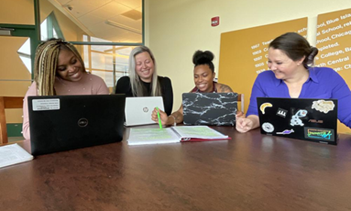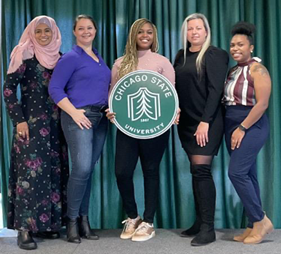5 Steps to Level Up Research Using a Writing Circle
This article shares experiences of our first writing circle as Master of Occupational Therapy students in a Research Project course. Our mini cohort of four founded a tri-weekly writing circle, selecting common topics, sharing drafts, and helping each other to become better writers overall.
Step 1: Find a topic of interest.
The most important thing about research is finding a topic you’re passionate about to research! You want to make sure that you have room to grow in your research topic area so the research is informative and keeps you interested. The idea behind choosing a research topic you have more to learn about is that even when things get complicated, your passion will drive your work. We worked on decolonial praxis in the occupational therapy profession, a topic both interesting and personally important to us. Decolonial and decolonization are commonly used due to culture and race issues at the nation's forefront. Cognizant of the multiple definitions and understandings of these terms, we defined decolonial as the dismantling of colonial practices on the physical, psychosocial, institutional, and social levels to implement practices of indigenous people into mainstream practices to encourage and facilitate equity. Decolonial praxis is defined as reflexive world interventions that seek to target and dismantle the colonial matrix of power. Focusing on this topic and its implications kept us engaged as we researched and began our writing circle.
Step 2: Schedule consistent meeting times.
Our writing circle allocated a specific time each week to sit as a group of students (with our faculty advisor present or not) to write, collaborate, and offer advice and support. We chose a time that worked with our school schedule and everyone's personal lives, which allowed us room to focus only on our writing circle. A consistent weekly meeting became part of our routine and allowed the writing circle to flow organically into our daily routine without feeling overwhelming.
Step 3: Break down the tasks, and breathe.
As four novice researchers, we began the research course feeling very anxious, viewing research as a giant monster, humorously articulated by Michaele, one of our writing circle members: "Screaming. I was screaming in my head about the news we had just received. It was the first week of our research class, and our faculty mentor shared that in addition to our research work, we had the opportunity to co-author a literature review and possibly present our paper at the World Federation of Occupational Therapists 2022 in Paris. What? WHAT? I felt so completely overwhelmed by the monstrous task set before us. Overwhelmed, terrified, nervous… Mais excité aussi (but excited also)!" Despite the boiling anxiety, our writing circle allowed us to break down big tasks into manageable bits and keep the ball rolling as we tackled our decolonial writing. This encouraged us to write a little each day, thus enabling daily writing practice and honing our skills.
Step 4: Fuel your research with your passion.
The research process pushed us to learn and discuss more about decolonial praxis in occupational therapy and has helped shape our growth into the practitioners we strive to be. The articles we found were a combination of inspiring, appalling, and intriguing all at once. We were excited to bring our articles in to discuss and write thoughtful pieces to contribute to our work. We spent time reading and analyzing articles and writing reflections as a unit. While dissecting the issues posed, we took time connecting the pieces of information to our day-to-day activities and picked out recurring themes. We felt that our writing circles became active and engaging dialogues, instead of schoolwork. The writing circle allowed us to break down and analyze the articles we were finding. Something that we struggled with independently became effortless in our circles. We used the passion for the topic to dive deeper into our conversations and analyses, and consequently to further the research.
Step 5: Collaborate and fuel each other!
We participated in collaborative writing and personal writing, merging pieces of work into coherent chunks of material. We found ourselves taking notes while actively listening to each other because the information was either intriguing or resonated with us somehow as we grappled with our intersectional struggles. Collaboration was the center of our writing circle and success. Giving and receiving feedback was a key component of our learning journey, teaching us the importance of authenticity and honesty with feedback. Together, we were motivated to write and think critically, ultimately becoming more confident in our research skills. Our gatherings aided in increasing our vocabulary and using the new decolonial language we were becoming fluent in. The writing circle increased our writing self-confidence. The camaraderie helped us learn from each other in perspective taking and increased intellectual and emotional insight as we shared our thought processes in approaching the decolonial content. We shared laughs, and tears of joy from those laughs, shouting out synonyms, antonyms, and other big words, adding light humor to what can be a weighty topic.
Although our research adventure has been a demanding process, every piece of the journey has been a beautiful learning experience. We encourage other students to embark on the trip, take the leap, and open their minds. The research you do will change your life and, ideally, be a piece to change the world. Find a topic that interests you and a professor who motivates you. Find passion in your work, and it will be enjoyable even in the darkest times. Engage in writing circles and challenge yourself and your peers. Utilize the writing circles to open up and learn from each other and expand your knowledge and skills. Who better to get feedback from and give feedback to than your peers? Working together makes all the difference and pushes you to be your best self, helping the wheels turn and the ideas flow. Occupational therapy makes it possible to be a researcher, advocate, practitioner, and change agent all at the same time. Take the leap.
Asia Clark is a second year MOT student at Chicago State University. She is a practicing COTA/L and currently the SOTA Activities Chairperson. She is passionate about the pediatric population and loves working in acute care.
Marissa Epps is a second year MOT student SOTA—ASD/ Professional Development Chairperson. She has an interest in serving underserved communities and being a catalyst for change.
Marina Mishin is a second year MOTS at Chicago State University. She has an interest in psych and adult geriatric population.
Michaele Singleton is a second year MOT student at Chicago State University. She has an interest in Early Start and serving young children and families.

From left to right: Our bi-weekly writing circle - Marissa Epps, Marina Mishin, Asia Clark, Michaele Singleton

From left to right: Dr. Fatima Hendricks, Michaele Singleton, Marissa Epps, Marina Mishin, Asia Clark
Resources
Sefa Dei, G. J. (2019). Foreword. In Decolonization and anti-colonial praxis. Brill. https://brill.com/view/book/edcoll/9789004404588/front-6.xml
Vopat, J. (2009). Writing circles: Kids revolutionize workshop. Heinemann.